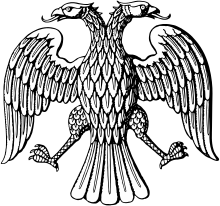Worker's Marseillaise
| English: Worker's Marseillaise | |
|---|---|
 | |
Former national anthem of Russia Former national anthem of Russian SFSR (Briefly, alongside The Internationale) | |
| Lyrics | Pyotr Lavrov |
| Music | Robert Schumann |
| Adopted | 1917 |
| Relinquished | 1918 |
| Preceded by | "God Save the Tsar!" |
| Succeeded by | "The Internationale" |
| Audio sample | |
Рабочая Марсельеза (instrumental)
| |
The Worker's Marseillaise (Russian: Рабочая Марсельеза, tr. Rabochaya Marsel'yeza, IPA: [rɐˈbot͡ɕɪjə mərsʲɪˈlʲjezə]) is a Russian revolutionary song named after the Marseillaise. It is based on a poem of Pyotr Lavrov, first published on 1 July 1875 in London as A new song (Russian: Новая песня, tr. Novaya pesnya). The poem reflects a radical socialist program and calls for the violent destruction of the Russian monarchy. At the end of 1875 or in 1876, this poem began to be sung in Russia to the melody of the last verse of the Robert Schumann's song Die beiden grenadiere. Schumann's melody is inspired by the French Marseillaise, but it is original. Thus, the melody and lyrics of the Worker's Marseillaise have nothing to do with the French Marseillaise. The song is close to the Russian cruel romances, and this influenced its popularity. The name the Worker's Marseillaise has been fixed since the 1890s.[1]
It existed alongside several other popular versions, among others a Soldier's Marseillaise and a Peasant's Marseillaise.[2]
This anthem was popular during the 1905 Russian Revolution and was used as a national anthem by the Russian Provisional Government until its overthrow in the October Revolution. It remained in use by Soviet Russia for a short time alongside The Internationale.[3] During the 1917 Revolution it was played at all public assemblies, street demonstrations, concerts and plays.[2]
Lyrics[]
| Russian translation | Transliteration | Literal English translation |
|---|---|---|
Отречёмся от старого мира! |
Otrechyomsya ot starogo mira! |
Let's renounce the old world |
See also[]
- La marseillaise de la Commune, French revolutionary song created and used by the Paris Commune in 1871.
- Deutsche Arbeiter-Marseillaise (German Workers' Marseillaise), German revolutionary song
References[]
- ^ Fakhretdinov, Rustam (2018). ""Russkaya marseleza": zhestokiy romans Petra Lavrova ["The Russian Marseillaise": A Cruel Romance of Pyotr Lavrov]". Antropologicheskij Forum. 14 (36): 117–153. doi:10.31250/1815-8870-2018-14-36-117-153.
- ^ Jump up to: a b Figes, p. 355
- ^ http://www.hymn.ru/paper-soboleva-200501.pdf, pp. 10–12
Bibliography[]
- Figes, Orlando (2014). A People's Tragedy: The Russian Revolution 1891–1924. London: The Bodley Head. ISBN 9781847922915.
- Asian anthems
- Historical national anthems
- Russian anthems
- Russian Revolution
- Socialist Revolutionary Party
- Socialist symbols
